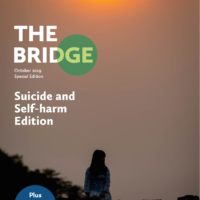Non-Suicidal Self-Injury (NSSI)
-

Self-harm in children and adolescents: attention seeking or cause for concern?
Is the reporting of self-harm improving due to better awareness, or are young people really self-harming at increasing rates? How concerned should we be about the increase? In this blog, I draw on recent work by my colleagues in the Multicentre Study of Self-Harm in England.
Read more -

2019 Judy Dunn National Conference ‘Suicide and self-harm in young people’ – Prof. Christian Schmahl
The 2019 Judy Dunn Conference focused on ‘Suicide and self-harm in young people’. Prof. Christian Schmahl on the ‘Neurobiology of self-harm in BPD’. ACAMH members can now receive a CPD certificate for watching this recorded lecture. Simply email membership@acamh.org with the day and time you watch it, so we can check the analytics, and we’ll email you your certificate.
Read more -

In Conversation… Suicide and Self-harm with Dr Abigail Russell
Abigail discusses her paper on inflammation and self-harm, its findings and implications moving forward. As well as the cohort study (ALSPAC), to school interventions and creating change through national dialogue.
Read more -

Suicide and Self-Harm Special Edition
The National Confidential Enquiry into Suicide and Safety in Mental Health Annual Report (2018) highlighted that suicide in the under 20’s is rising generally and that the number of suicides rises towards late teens.
Read more -

Individual changes in stress-level predict non-suicidal self-injury
In their latest study, Adam Miller and colleagues propose that these inconsistencies might be due to a reliance on “between-person” models that compare individuals with high stress levels to those with low stress levels.
Read more -

Continued family dysfunction accounts for the association between childhood adversity and adolescent self-harm
Non-suicidal self-injury (NSSI) is any deliberate attempt at inflicting physical self-harm in the absence of suicidal intent. NSSI peaks during adolescence, with roughly 17% of adolescents reporting having engaged in it at least once.
Read more